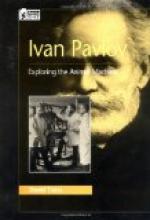|
This section contains 13,050 words (approx. 44 pages at 300 words per page) |

|
1849–1936
RUSSIAN PHYSIOLOGIST, PSYCHOLOGY RESEARCHER
ST. PETERSBURG UNIVERSITY, 1875; IMPERIAL MEDICAL ACADEMY (A.K.A. MEDICAL-SURGICAL ACADEMY), MD, 1879
Brief Overview
Although he won the Nobel Prize for his research on the physiology of the digestive system of dogs, Ivan Pavlov left his most lasting legacy in psychology. In a career that spanned nearly seven decades, Pavlov discovered the basic concepts behind associative learning in both animals and humans. His theory of conditioned reflexes, or "training" individuals to respond to a neutral stimulus, laid the groundwork for behavioral psychology and associative learning theory. In addition, his work on experimental neuroses, or behavioral and thought problems caused by conditioning techniques, explained the causes of some mental disorders and, more importantly, helped develop effective behavioral therapy methods.
Pavlov began to study conditioned reflexes after conducting research on the digestive system of dogs. He discovered that his laboratory dogs would...
|
This section contains 13,050 words (approx. 44 pages at 300 words per page) |

|


